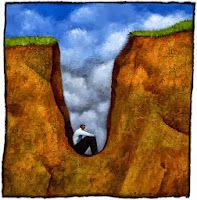In a previous blog post I wrote about “The McDonald’s Syndrome."
My intent was not to write about McDonald’s $MCD, the
corporation; rather just using this behemoth as an example to illustrate
the point I was making. Then,
people who read my hypothesis started emailing questions like “Did
you mean…?” or “Are you saying…?”
I hadn’t been successful
in driving my point home. For an old,
retreaded sales guy, that equals epic failure! So, I thought to write a follow-up in an
attempt to right the previous wrong.
People are somewhat blinkered – often blinded – by their current
surroundings, daily tasks, routine, personal comfort zones, etc.
This causes a monotonous humdrum of everyday activity. We end up rising at around the same time
every morning to get ready for work.
Then we all commute in the same direction – reversing
same at the end of the day – with everyone else. We spend 8+ hours of our daylight hours at
work alongside a group of similarly-minded people, while we perform mostly the same
activities as everyone else (or as every other day), or both.
Now… somewhere along the way we may become distracted or
disenchanted with the everyday humdrum, encouraged by some new technology or
event, motivated by a possible new opportunity, or something of this nature.
When the above happens, people automatically lock their thinking and aspirations within
their personal McDonald’s Syndrome. For example, a customer service rep at Bank of
America $BAC may look to join Chase $JPM.
(Note that a bank customer service
rep joining e.g. Verizon $VZ, is still stuck in the McDonald’s Syndrome… same type
of job, perhaps for slightly higher pay, perhaps temporarily enjoying new-found
happiness due to the change in commute/surroundings/scenery/people!)
There’s nothing inherently wrong with the above. Doing the best job one is able to do – given
personal talent and skills – is an admirable trait. Taking the risk of potentially changing one’s
job is a normal part of human evolution for some… i.e. seeking to better personal circumstances,
earnings, learning new skills, etc.
On the other hand, it’s most unusual to challenge oneself
beyond the McDonald’s Syndrome. By way of an example, consider this thought
process: Starting point: Working for
company X, doing job Y, earning Z.
Focusing on Z above, let’s assume that in addition to
satisfying all the basic requirements of Maslow’s hierarchy of needs (1943)…
you’d like to earn more cash. So, for the purposes of my example, let’s
further assume that Z = $30,000 in annual income.
Thinking beyond our own McDonald’s
Syndrome, let’s make the leap to a loftier goal, e.g. a dramatic shift in earnings
to $30,000 monthly, for an annual income of $360,000. OMG... are you kidding?
Impossible?!
Maybe, but setting higher goals that are actually achievable
is a much more admirable trait. Now, say
you only manage to reach ~30% of your new goal.
The horror! A hopeless under-performance delivers $120,000 in annual income, and you were previously
happy selling your services for $30,000 annually!
How? Well, the good
news – as a starting point – is that you don’t even have to leave your existing job (or the new one at Chase or Verizon). As long as any extra-curricular activities
don’t negatively impact your ability to perform in your day job!
Note: The reverse McDonald’s
Syndrome is one where employers look to hire and pay within acceptable
salary tiers. Their hiring criteria would
include experience for the current position and earnings that fit within a
range of what they – as the employer (or buyer of services) – are prepared to pay for that work/position.
But, you could e.g. make or source a product that you could e.g. sell
on eBay $EBAY, or at arts and crafts markets on weekends.
If you happen to have one available, maybe you could rent out your basement apartment? Could you turn a hobby, like carpentry or knitting, into cash?
Write a book, and sell it.
Nowadays, you can self-publish for free on Amazon’s Kindle Direct
Publishing. Instead of watching TV,
write. Publish. If it doesn’t sell well, write another one. Practice. You’ll get better at it over time,
promise!
How much time do we waste engaged in mindless activities;
like watching TV, commuting for 10 hours a week, playing video games, sleeping
in?
Get healthy, get moving, and use the limited time you’ve
been granted wisely!
Oh yeah… slip out of the McDonald’s Syndrome, and out of the hole you've been digging!
Disclosure: no positions
